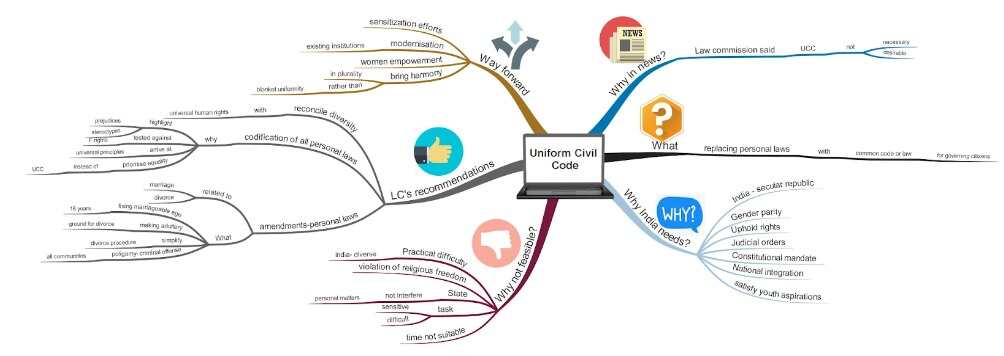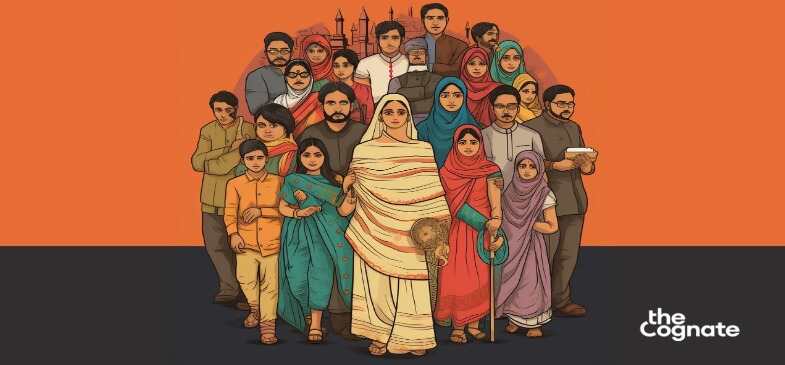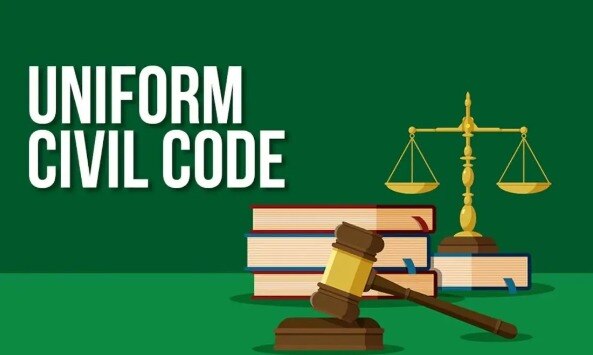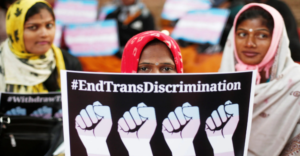The Uniform Civil Code is defined in our Constitution under Article 44 which states that the state must secure for the citizens a Uniform Civil Code throughout the territory of India. The common set of governing rules for all citizens of India refers to replacing the personal laws (based on religious scriptures and customs).
These laws are famous in public law and cover marriage, divorce, in hof inheritance, adoption, and maintenance. Goa is the only state that has common family law and the 1954 Special Marriage Act allows any citizen to marry outside the realm of any special religious personal law.
The Origin of Uniform Laws
The British Government in 1840 based on the Lex Loci report had framed Uniform laws for crimes, evidence, and contracts but the personal laws of Hindus and Muslims were left by them somewhere intentionally. On the other hand, the British India Judiciary provided for the application of Hindu, Muslim, and English law by British Judges. Also, in those days reformers were raising their voices to laws related to women against the discrimination done by them basically under religious customs like Sati, etc.
Constituent Assembly was set up to our Constitution in 1946 in Independent India which consisted of both types of members: those who wanted to reform the society by adopting a Uniform Civil Code like Dr. B. R Ambedkar and other Muslim representatives who perpetuate personal laws. Also, the proponents of the Uniform Civil Code were opposed by the minority communities in the Constituent Assembly. As a result, only one line is added to the Constitution under Article 44 in Part IV of DPSP (Directive Principles of State Policy).
Socially, the literate persons of the country have analyzed the pros and cons of UCC & on the other hand, the illiterate who have no idea about it and are under hands of political pressure will make a decision. And religiously, there is a gap between the Hindus who are in the majority and the Muslim minority community.
Do you know that in 1985, the Supreme Court first directed the Parliament to a UCC?
Shah Bano Case
Mohammad Ahmed Khan v. Shah Bano Begum mainly known as Shah Bano Case. In this case, in 1985, Shah Bano moved to the Supreme Court to seek maintenance under section 125 of the Code of Criminal Procedure when her husband divorced her after 40 years of marriage by giving triple talaq and denied her regular maintenance. The Supreme Court gave a verdict in favour of Shah Bano by applying section 125 of the Indian Criminal Code and it is applied to all citizens irrespective of religion. Then Chief Justice, Y.V Chandrachud, observed that a Common Civil Code would help the cause of national integration by removing disparate loyalties to law. And so, the court directed Parliament to a UCC.
On the other hand, Rajiv Gandhi’s Government was not satisfied with the court decision; instead of supporting it, the government enacted the Muslim Women (Protection of Rights on Divorce) Act, 1986 to nullify the Supreme Court judgment in Shah Bano Case and let the Muslim Personal Law prevails in divorce matter. In this act, it was mentioned that a Muslim woman has the right to maintenance only for three months after the divorce i.e. Iddat, and then shifted her maintenance to her relatives or Wakf Board.
Sarla Mudgal Case
This is the second instance in which the Supreme Court again directed the government under Article 44. In this case Sarla Mudgal v Union of India, the question was whether a Hindu husband, married under Hindu law, by embracing Islam can solemnize second marriage. The Supreme Court held that adopting Islam for a second marriage is an abuse of Personal laws. Further said that Hindu marriage can be dissolved under the Hindu Marriage Act, 1955 i.e. merely by converting to Islam and marrying again does not dissolve the marriage under Hindu Marriage Law and thus will be an offence under Section 494[5] of the Indian Penal Code.
John Vallamattom v. Union of India Case
The Priest from Kerala, John Vallamatton filed a writ petition in the year 1997 stating that Section 118 of the Indian Succession Act was discriminatory against the Christians as it imposes unreasonable restrictions on their donation of property for religious or charitable purposes by will. The bench comprising Chief Justice of India V.V Khare, Justice S.B Sinha, and Justice A.R. Lakshamanan struck down the Section, declaring it unconstitutional.
“Article 44 provides that the State shall endeavour to secure for all citizens a Uniform Civil Code throughout the territory of India. It is a matter of great regret that Article 44 of the Constitution has not been given effect. Parliament is still to step in to frame a common civil code in the country. A Common Civil Code will help the cause of national integration by removing the contradictions based on ideologies.

Juvenile Justice ACT 2014 giving base to the Unifrom Civil Court
Passing the verdict of the Juvenile Justice (Care and Protection of Children) Act seems to be an attempt to move towards the Uniform Civil Code. It paved the way for the adoption of children by persons from Muslim Communities even though not allowed under their laws. The Supreme Court of India again asked the Union Government to form a Uniform Civil Code to remove gender inequality and abolish the retrograde practices followed under the framework of personal laws.
Is the Uniform Civil Code important?
A Uniform Civil Code would put in place a set of laws to govern the personal matters of all citizens irrespective of religion is the need of the hour. It is the cornerstone of true secularism. Such a progressive reform would not only help end discrimination against women on religious grounds but also strengthen the secular fabric of the country and promote unity.
There is a need to reform our social system, which is full of inequities, discrimination, and other things that conflict with our Fundamental Rights. As we know there is a Criminal Code that applies to all people irrespective of religion, caste, tribe, and domicile in the country but there is no similar code related to divorce and succession which are governed by Personal laws.
The need for a Uniform Civil Code is related to inconsistencies in Tax laws. Like Hindu Undivided Families, they are exempted from taxes where whereas Muslims are exempted from paying stamp duty on gift deeds. It also deals with the problem of Honour killings by extra-constitutional bodies like Khap Panchayats.

Now it is necessary to understand Article 25 with that of UCC
Article 25 states Freedom of conscience and free profession, practice, and propagation of religion. So, the Uniform Civil Code cannot be forcefully imposed on the people as then it would be a violation of Article 25 of the Indian Constitution. Therefore, UCC and Personal laws should be co-existed. The uniform civil code is nothing but the incorporation of modern and progressive aspects for all existing personal laws which can’t be ignored.
The Uniform Civil Code in Goa
After Independence, the State of Goa adopted the Portuguese Civil Code which enforced a Uniform Civil Code for all its citizens. Under this code, the Married couple holds joint ownership in all assets owned and acquired by each spouse. Even if Parents can’t disinherit their children entirely at least half of the property must be passed on to them. Muslim persons who have registered their marriage in Goa are not allowed to practice polygamy.
Uniform Civil Code in Uttarakhand
The Uttarakhand Cabinet approved the final draft of the Uniform Civil Code, which proposes uniform civil laws for all communities in the state and will be tabled in the legislative assembly on Tuesday. A draft report consisting of four volumes and more than 740 pages was created by a group that included retired justice Pramod Kohli, social activist Manu Gaur, former chief secretary of Uttarakhand Shatrughan Singh, and vice-chancellor of Doon University Surekha Dangwal.
The Uniform Civil Code Uttarakhand 2024 Bill allegedly has suggestions to forbid child marriage and polygamy altogether. Equal property rights for sons and daughters, the abolition of the distinction between legitimate and illegitimate children, equal property rights after death, and the inclusion of adopted and biological children are some of the major elements of the bill.
Conclusion
According to my point of view for an ideal state, UCC would be an ideal safeguard of citizens’ rights. Its adoption will be a progressive legislation. With changing times, the need has arisen for having a Uniform Civil Code for all citizens, irrespective of religion, ensuring that their fundamental and Constitutional rights are protected. Even Secularism and National Integrity can also be strengthened by introducing UCC.
In the end, we should recall the words of Mahatma Gandhi: “I do not expect India of my dreams to develop one religion, i.e. to be wholly Christian or wholly Mussalman, but I want it to be wholly tolerant, with its religious working side-by-side with one another”.
– RIYA SINGH
Must Read: CLIMATE COUNTDOWN: UNDERSTANDING THE URGENCY OF ACTION





